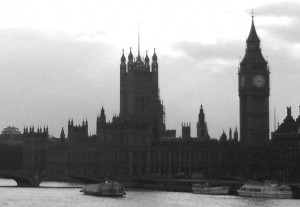I’d Do Anything: Week 3
[flashvideo filename=”http://sjhoward.co.uk/video/oliverweek3.flv” ratio=”16:9″ picture=”http://sjhoward.co.uk/video/oliver.jpg” /]
This post was filed under: I'd Do Anything, Video.
[flashvideo filename=”http://sjhoward.co.uk/video/oliverweek3.flv” ratio=”16:9″ picture=”http://sjhoward.co.uk/video/oliver.jpg” /]
This post was filed under: I'd Do Anything, Video.
The British rail network baffles me – a return ticket costs £112, but five singles for the same journey is £41. Where’s the logic? «
This post was filed under: Diary Style Notes.
What possesses certain ladies to remove their eyebrows and redraw them six inches higher? Why do they not realise how ridiculous it looks? «
This post was filed under: Diary Style Notes.
 Over the past decade or so, this government has become frighteningly bad when it comes to creating legislation – not just because I disagree with much of it, but also because some of it is just bad. Much of this bad legislation is passed for the supposed purpose of ‘preventing terrorism’. Whatever that really means.
Over the past decade or so, this government has become frighteningly bad when it comes to creating legislation – not just because I disagree with much of it, but also because some of it is just bad. Much of this bad legislation is passed for the supposed purpose of ‘preventing terrorism’. Whatever that really means.
Time and again, this Labour government has passed extreme legislation – some of which has later been found to be in breach of Human Rights – which ministers have claimed will be used only in ‘specific, extreme circumstances’ – or sometimes even at the sole discretion of the Home Secretary of the day. Whoever that might be.
Those laws are, by definition, bad.
Our own history shows us that laws created for a specific purpose but not legislatively restricted for such use will be willfully misused, whether by the same government, a future government, or quick-thinking individuals. You cannot pass a law and then propose not to use it – it’s illogical, dangerous, and unnecessarily restrictive of freedom.
Just this week, a council has been found to be covertly spying on families applying for school places, in order to ensure that they genuinely reside within the catchment area. The government told us that this was ‘anti-terror legislation’ – and, by all accounts, is now shocked at this apparent misuse of the law.
Yet they created the law. They knew that such situations could arise, and actively chose not to restrict use of the legislation. It’s shocking that a government can pass such sloppy legislation, and then not monitor for its misuse or more actively prevent it.
If a government insists on using its powers in such a slapdash fashion and then overriding the due concerns of the House of Laws through the overuse of the Parliament Act, then it can only be considered a bad government – and one which should be removed from power as soon as possible.
» Image Credit: Photograph from my personal collection
This post was filed under: News and Comment, Politics.
Umbrella Watch: My cheap umbrella has survived its 1st April shower, though its plastic toggle was less pleasant than my old wooden handle. «
This post was filed under: Diary Style Notes.
The BBC’s I’d Do Anything is one of my guilty pleasures in life…
The uninitiated amongst you may not know that this is the third in a series of programmes during which Andrew Lloyd Webber picks a new West End star. The earlier versions were How Do You Solve a Problem Like Maria? and Any Dream Will Do. The shows are particularly notable for the exit sequence, during which the person voted off the show just moments previously has to perform with the other Marias / Josephs / Nancys “saying goodbye in their own special way”, as Graham Norton puts it each week.
Anyway, I love it. Here’s a compilation clip from the exit sequences so far this series. (Given that my finals are just weeks away, yes, I probably should have been doing something more useful with my time…)
[flashvideo filename=”http://sjhoward.co.uk/video/oliverweek2.flv” ratio=”16:9″ picture=”http://sjhoward.co.uk/video/oliver.jpg” /]
This post was filed under: I'd Do Anything, Video.
Umbrella Watch: Dismayed at having to replace my umbrella in APRIL, I bought a cheap plastic construction. How long will it last? Stay tuned «
This post was filed under: Diary Style Notes.
The sidebar on sjhoward.co.uk now loads after the content. A satisfying, neat removal of an illogical legacy of the 2005 version of the site «
I’m pleasantly surprised to report that Safari for Windows is better than I expected. Firefox 3 Beta 5 is a bit of a disappointment. «
This post was filed under: Diary Style Notes.
Everyone knows that Sky News like to be first with the breaking news, but (just as has happened tens of times before on their news channel) their website might be jumping the gun in its reportage of Prince Philip’s health:

One suspects that the headline “The Duke of Edinburgh, The Very Model Of A Modern Royal Consort, Dies Aged 86” might not be welcomed by the Palace right now: I’m not sure if anyone from Sky News reads this site, but if so, you might want to remove this ‘suggested link’ from this page if ever you want any form of Royal interview or exclusive ever again…
This post was filed under: Media, News and Comment.
 There is a scene in The West Wing, part way through Barlett’s campaign for a second term, when Toby Zeigler becomes aggravated by the constant appearance of banners demanding “Barlett for President”, insisting – rightly – that they should declare “Bartlett is President”.
There is a scene in The West Wing, part way through Barlett’s campaign for a second term, when Toby Zeigler becomes aggravated by the constant appearance of banners demanding “Barlett for President”, insisting – rightly – that they should declare “Bartlett is President”.
It’s an interesting vignette designed to demonstrate the assumed political truism that the incumbent of any given office automatically has an advantage over any pretender: A fact which is almost always true in politics.
The incumbent should have an advantage, since people inevitably like to vote for something known over something unknown. Political parties all too often forget that people don’t vote on the basis of promises, but on the basis of actions: Telling people you’ll do all of what they want can never rival the power of actually doing some of what they want.
On top of this, the incumbent has the advantage, by default, of being the more Presidential or Prime Ministerial figure – exactly the kind of figure one would want leading a nation, and hence the one most people are likely to vote for. People have great difficulty seeing past superficial appearances, as has been proved so many times in so many fields.
Yet, at times of major political flux, the rules of the game inevitably change. The last such occasion was 1997, a seminal year in many spheres and hence unsurprisingly a seminal year in the political world as well. People had become tired of a government which itself had become tired, and of a Prime Minister who really had little more to do.
Compare this with Tony Blair’s two election victories as Prime Minister. He was able to compare the state of the nation at the time of the election with the pre-1997 state of the nation, and make a convincing argument for improvement. He could cherry pick his greatest achievements and promised to build upon them. He had the incumbent’s advantage, and it served him well.
Yet now, in 2008, Labour’s greatest achievements no longer resonate. We’ve tired of hearing of the New Deal, the minimum wage is old news, and NHS reform has been done to death. It seems like this government has nothing new to do – it’s done it all before, and we’re comparing Labour’s current promises with Labour’s previous delivery. The ‘bad old days’ of the Tories have slipped from the public conciousness, and it’s now very difficult for Gordon Brown to make a case for Labour’s successes without comparing to Labour’s previous failings.
Indeed, even systemic failures of government – such as the recent furore over MP’s expenses – now enter the public conciousness as failings of Labour by default, as they are in government, even though they are often cross-party failings which should tar the Parliamentary machinery as a whole. Labour, as the party of government, gets all of the negative publicity, yet very little positive publicity for reform work since it appears that most of it is already underway. There are few earth-shattering initiatives left to announce, and the media quickly tire of reporting ongoing work.
The fact is that David Cameron now has the advantage. He’s able to point out the failings of the Labour government without having to defend the failings of previous Conservative governments. In many ways, this moving forward of the agenda is his greatest achievement to date.
David Cameron is now able to play the ‘one of us’ card which Tony Blair used so effectively in 1997. Cameron wants to show that he’s not part of the ‘establishment’. He listens to Morrissey, he thinks you should consider the whole man not just the political front, and any political faux pas merely plays in his favour.
The recent coverage of him breaking cycle laws is a PR gift, likening him to almost anyone who’s ever ridden a bike rather than a nitpickingly law-abiding po-faced politician. Similarly, his refusal to answer questions about whether he’s taken cannabis merely leads much of the population to assume that he has – and hence identify with him further.
The well-oiled media machine around Cameron helps him to cultivate this image perfectly – anything which might be to it’s detriment is quickly swept under the carpet, whilst extensive comment and hence more extensive copy is given to ’embarrassments’, like the cycling incident, which actually improve his image.
At present, David Cameron is playing a blinder, and the most incredible part of his strategy is that every jibe coming from attack-dog Labour only enhances his image – it comes across as the formed establishment trying to keep out the young incoming reformer.
All-in-all, it’s difficult to see where Cameron can go wrong at this point. The only effective strategy Labour has is to expose him as a carefully managed establishment figure – but in so-doing, they can only expose themselves as the same, and probably end up harming their own campaign as a result.
The results of the upcoming local elections will be fascinating. Whilst local elections rarely form an accurate reflection of the national game, it will be interesting to see if the Conservatives can make the gains necessary to solidify their position as the certain electoral leaders and gain yet more momentum going forward.
Essentially, though, even if the Conservatives fail to make huge gains in these elections, it’s unlikely Labour will, and so the worst possible outcome is neutral. In essence, as far as I can see and unless something radically unexpected happens, there’s no way the next government can be Labour: Cameron is quickly cycling towards election victory.
» Image Credit: Picture taken by Alison Ratcliffe, modified under licence.
This post was filed under: News and Comment, Politics.
The content of this site is copyright protected by a Creative Commons License, with some rights reserved. All trademarks, images and logos remain the property of their respective owners. The accuracy of information on this site is in no way guaranteed. Opinions expressed are solely those of the author. No responsibility can be accepted for any loss or damage caused by reliance on the information provided by this site. Information about cookies and the handling of emails submitted for the 'new posts by email' service can be found in the privacy policy. This site uses affiliate links: if you buy something via a link on this site, I might get a small percentage in commission. Here's hoping.